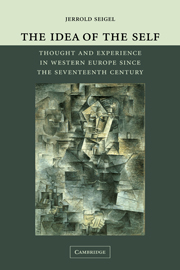Book contents
- Frontmatter
- Contents
- Acknowledgments
- PART I INTRODUCTORY
- PART II BRITISH MODERNITY
- PART III SOCIETY AND SELF-KNOWLEDGE: FRANCE FROM OLD REGIME TO RESTORATION
- 6 Sensationalism, reflection, and inner freedom: Condillac and Diderot
- 7 Wholeness, withdrawal, and self-revelation: Rousseau
- 8 Reflectivity, sense-experience, and the perils of social life: Maine de Biran and Constant
- PART IV THE WORLD AND THE SELF IN GERMAN IDEALISM
- PART V MODERN VISIONS AND ILLUSIONS
- Notes
- Index
7 - Wholeness, withdrawal, and self-revelation: Rousseau
Published online by Cambridge University Press: 05 June 2012
- Frontmatter
- Contents
- Acknowledgments
- PART I INTRODUCTORY
- PART II BRITISH MODERNITY
- PART III SOCIETY AND SELF-KNOWLEDGE: FRANCE FROM OLD REGIME TO RESTORATION
- 6 Sensationalism, reflection, and inner freedom: Condillac and Diderot
- 7 Wholeness, withdrawal, and self-revelation: Rousseau
- 8 Reflectivity, sense-experience, and the perils of social life: Maine de Biran and Constant
- PART IV THE WORLD AND THE SELF IN GERMAN IDEALISM
- PART V MODERN VISIONS AND ILLUSIONS
- Notes
- Index
Summary
Of all the figures we have considered so far, Jean-Jacques Rousseau occupies the most prominent place in the history of self-awareness and self-examination. Many of his contemporaries confronted the dilemmas of their own selfhood by reference to his person and example, known through his passionate, sometimes tortured, and often luminous writings on society, politics, education, and morals, most popular among them his epistolary novel Julie, or The New Heloise, in whose characters readers properly recognized many features of the author. By the time that book appeared, in 1760, Rousseau was already famous (to some notorious) for his two polemical Discourses, the first, on the Arts and Sciences, laying out a case for the malign effects of culture on society and morality, and the second on The Origins of Inequality, which many read as preferring life outside society to any form of civilized existence. Such a preference seemed confirmed by his personal behavior, often erratic, and driven by suspicion and fear that took on paranoid dimensions in the last decades of his life. Alienated from former friends such as Diderot and Grimm, he fell into weariness and isolation, seeing intrigues against himself everywhere, even in Hume's generous efforts to provide him with a refuge in England. Both his fame and the controversies surrounding him were heightened by the appearance of The Social Contract and Emile, his treatise on education, in 1762, but during the last decades of his life (he died in 1778) his literary efforts were almost wholly devoted to defense and self-justification.
- Type
- Chapter
- Information
- The Idea of the SelfThought and Experience in Western Europe since the Seventeenth Century, pp. 210 - 247Publisher: Cambridge University PressPrint publication year: 2005

